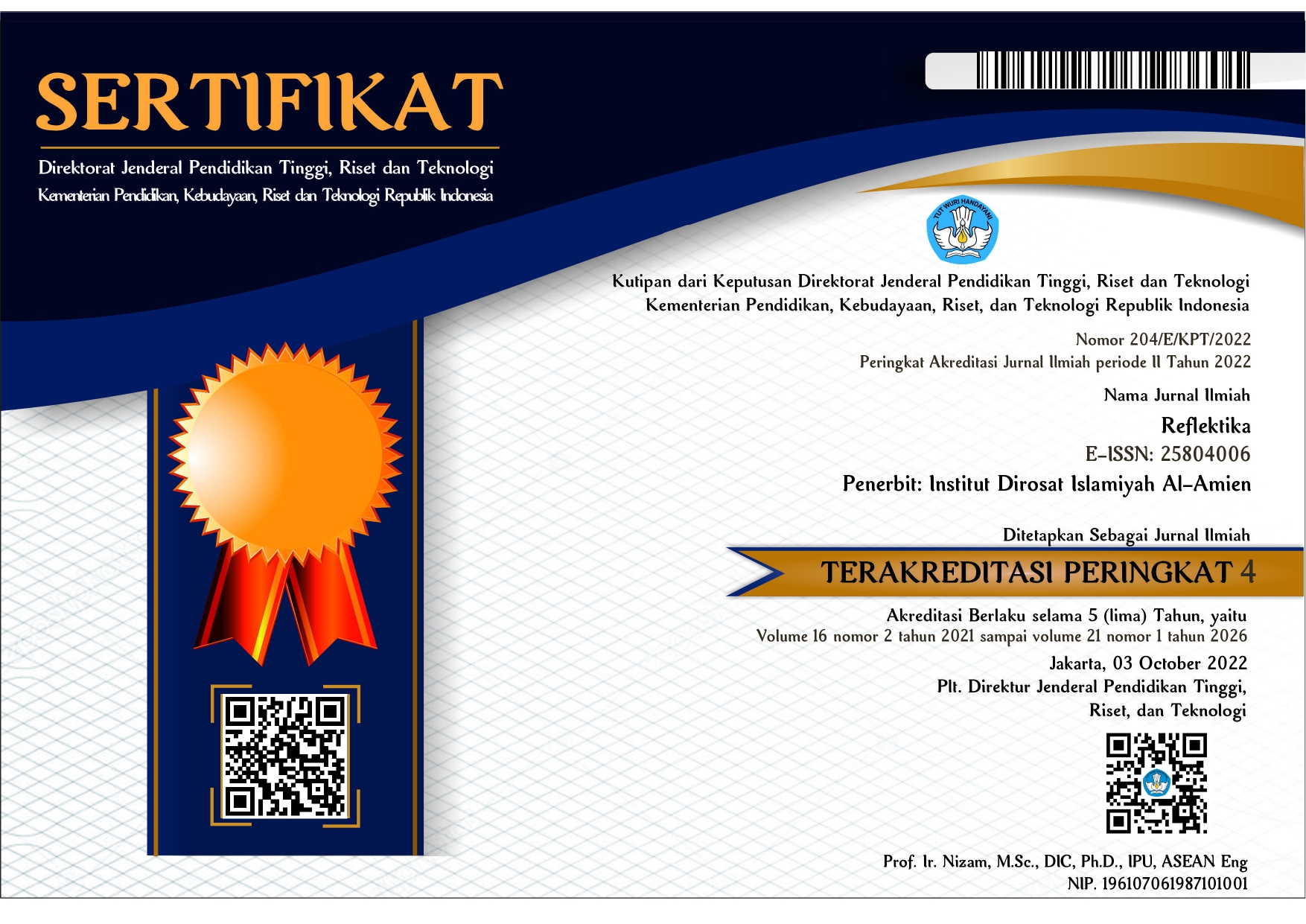MODERNISASI PENDIDIKAN ISLAM DAN RELEVENSINYA TERHADAP PENDIDIKAN ISLAM DI INDONESIA (TELA’AH PEMIKIRAN FAZLUR RAHMAN)
Abstract
The well-known figure of contemporary Muslim scholar, Fazlur Rahman, is a scientist who seeks to eliminate the dichotomy between modern science and classical Islamic teachings by integrating the two sciences into a complete and complementary unity to form Muslim intelligence who have broad insights and can answer all problems that arise according to the changing times. The researcher was interested in the thinking of this famous Muslim scholar because he was able to overcome various kinds of problems that arise in the world of Islamic education, and the figure of the scholar has given birth to a renewal of Islamic education to be far from stagnant. Researchers researched this modernist scientist to find the relevance between the idea of modernization of education presented by Fazlur Rahman and today's modernization of education in Indonesia. This type of research is library research, with a qualitative descriptive approach, a research method that intends to describe as a whole and critically social reality and various events that occur in society. The results found by the researcher after conducting this analysis contain the conclusion that there is relevance between the concept of modernization of Islamic education from Fazlur Rahman's perspective and the modernization of Islamic education in Indonesia, both regarding efforts to modernize Islamic education, goals, strategies and methods, criteria for educators and students, Islamic education systems and facilities, as well as critical thinking in dealing with problems that arise among humankind.
Keywords
References
Abuddin, Nata. Pemikiran Pendidikan Islam dan Barat. Jakarta: Rajawali Press, 2013.
Andi Darmawan, dkk. Pengantar Studi Islam. Yogyakarta: Pokja Akademik UIN Suka., 2005.
Arikunto, Suharsimi. Prosedur Penelitian suatu pendekatan Praktek. Jakarta: PT. Rineka Cipta, 1998.
Assegaf, Abdurrahman. Aliran Pemikiran Pendidikan Islam Hadarah Keilmuan Tokoh Klasik Sampai Modern. Jakarta: PT. Raja Grafindo Persada, 2013.
Gufron dan Mas’adi. Pemikiran Fazlur Rahman tentang Metodologi pembaruan Hukum Islam. Jakarta: Raja Grafindo Persada., 1998.
Hadi dan Aminul. “Konsep Pemikiran Fazlur Rahman Tentang Modernisasi Pendidikan Islam Dan Relevansinya Terhadap Pendidikan Islam Di Indonesia.†vol.Volume 2 Nomor 2, no. Jurnal Studi dan Penelitian Pendidikan Islam (Agustus 2019).
Ikhtiono, Gunawan. Pendidikan Nondikotomik Fazlur Rahman. Yogyakarta: Kanukaba, 2014.
Iqbal, Abu Muhammad. Pemikiran Pendidikan Islam (Gagasan-Gagasan Besar Para Ilmuwan Muslim). Cetakan 1. Yogyakarta: Pustaka Belajar, 2015.
Kurdi dkk. Hermeunetika Al-Qur’an dan Hadist. Yogyakarta: Sukses Offset, 2010.
Rahman, Fazlur. “An Autobiographical Note.†vol.Vol. 4, No. 2, no. Journal of Islamic Research (Oktober 1990).
———. Islam and Modernity: Transformation of an Intellectual Tradition. London: University of Chicago Press, 1982.
———. “The Qur’anic Solution of Pakistan’s Educational Problemsâ€, ‘Islamic Studies.’†vol.Vol. 6, No. 4 (1967).
Sanjaya, Wina. Penelitian Pendidikan: Jenis, Metode, dan Prosedur. Jakarta: Kencana, 2013.
Sibawaihi. Implikasi Pemikiran Ketuhanan Fazlur Rahman terhadap Pendidikan Islam dalam Usman, (ed.), Pendidikan Islam: konsep, Aksi, dan evaluasi,. Yogyakarta: Fakultas Ilmu Tarbiyah dan Keguruan, 2010.
Sugiyono. Metode Penelitian Manajemen. Bandung: Alfabeta, 2013.
Surakhmad, Winarno. Pengantar Penelitian Ilmiah. Bandung, 1992.
Sutrisno. Fazlur Rahman: kajian terhadap metode, epistemologi, dan sistem pendidikan. Yogyakarta: Pustaka Pelajar, 2005.
Tohet, Moch. “Modernisasi Pendidikan Islam (Telaah Pemikiran Fazlur Rahman).†vol.Vol. 3, No. 1, no. Jurnal Pendidikan Agama Islam (Juni 2019).
Ummu Mawaddah Dan Siti Karomah. “Relevansi Pemikiran Fazlur Rahman Terhadap Pendidikan Modern di Indonesia.†vol.Vol. 3, No. 1, no. Jurnal Al-Thariqah (Juni 2018).
DOI: 10.28944/reflektika.v17i2.1000
Refbacks
- There are currently no refbacks.


.png)

